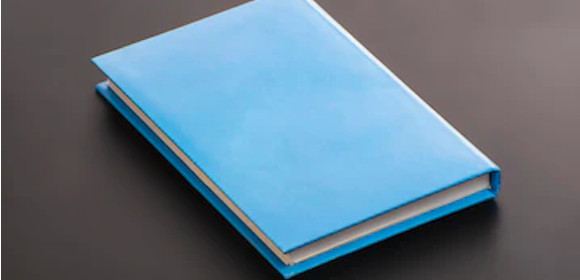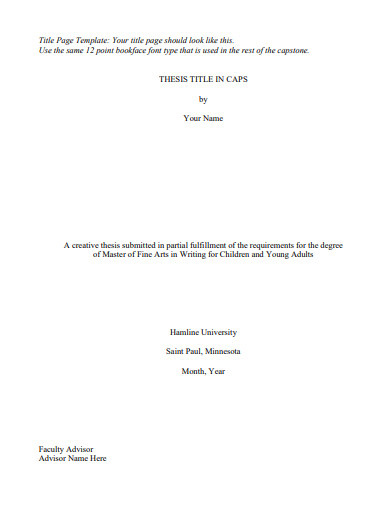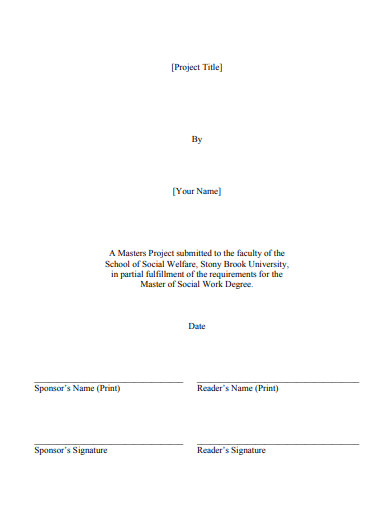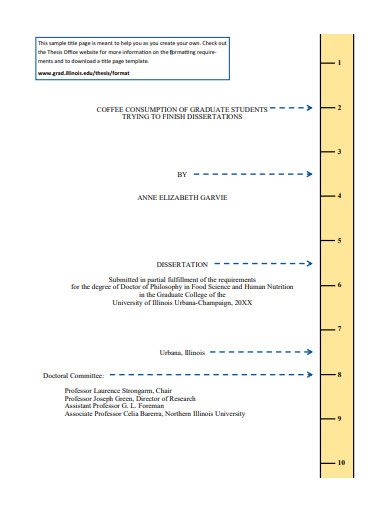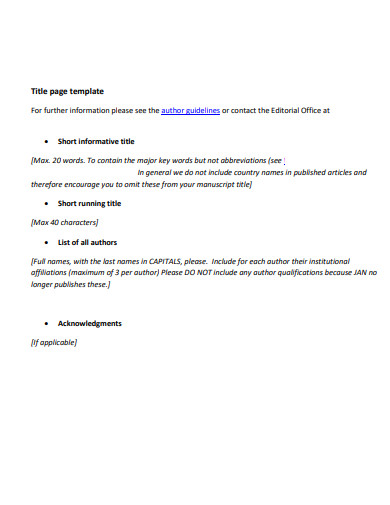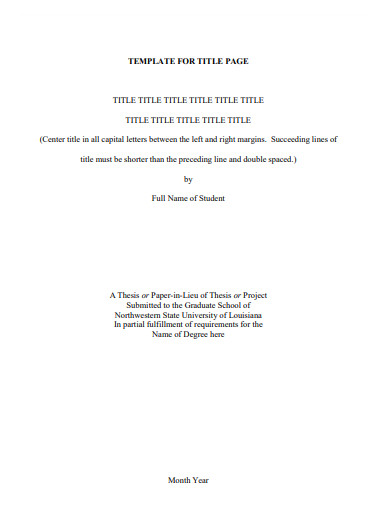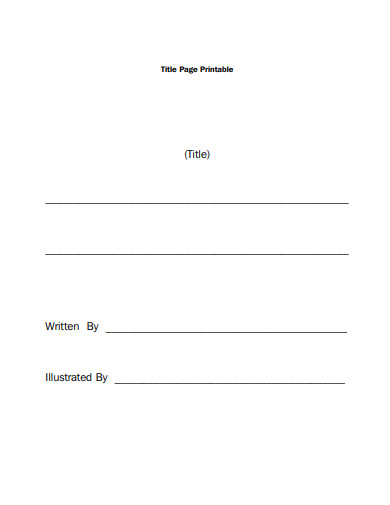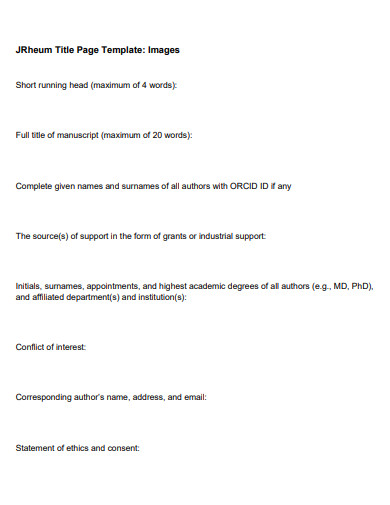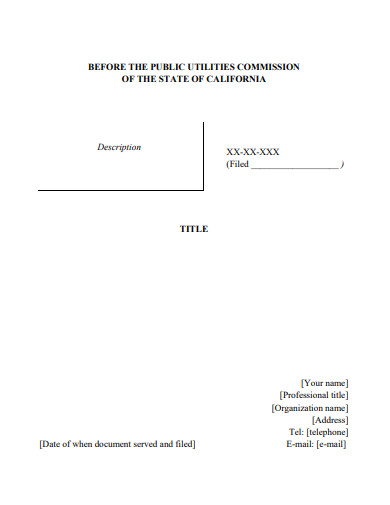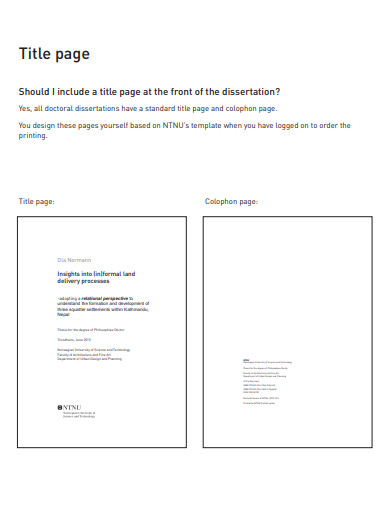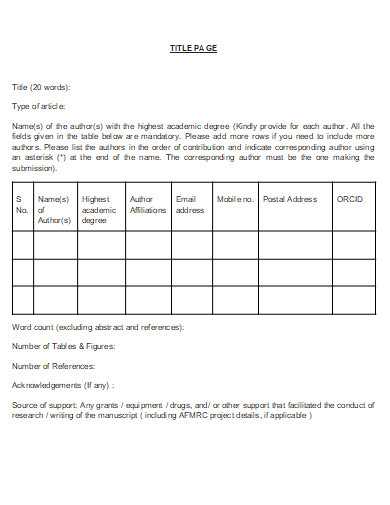You need to complete several elements when you are preparing a report. A report, proposal, or article may more or less have the following components: a table of contents, executive summary, the main body, a conclusion, an overview, and then there’s the title page. A good title page should be interesting and sort of captivating that the reader wants to read more about it. The need to include a title page in your paper is because you need something to help identify at first glance that it belongs to you. To learn more about this, let us discuss this further below. If you need any help preparing this, we’ve got a list of title page samples that are downloadable for free on this page.
10+ Title Page Samples
1. Title Page
2. Sample Title Page
3. Basic Title Page
4. Thesis Doctoral Title Page
5. Formal Title Page
6. Title Page Example
7. Formal Title Page
8. Editable Title Page
9. Blank Title Page
10. Title Page Format
11. Printable Title Page
What is a Title Page?
Writing a report has been something we have often done back when we were studying, probably around 4th grade when a teacher would start to request his or her students to submit a report. As you go older, the process of writing a report becomes more elaborated, as you learn to add more sections depending on the topic or research you are to present. But the most common section you find in all reports is the title page. This helps distinguishes your work from the rest, making it uniquely your own. Also, it is used to identify who has written the paper, what it is all about, and other details relevant to the context of the paper or research.
How to Create a Title Page
Usually, the first page you ever see, a title page may have its own style and format depending on the author or what is required of him or her. Basically, it isn’t hard to create a title page for your paper or work, you just need to know what font to use, or what details are to be included aside from the basics such as your name or the title of the paper you have written. To get you started, we’ve got several tips that will make it easier for you to do.
I. The Readers
Identify who will be reading your work, if this will be submitted to your teacher for grading then what you need to write down on the title page will not only be your name, title, or the date it was completed. You need to include your grade level/course, school name, and your teacher or instructor.
II. Fonts to Use
A title page should be as simple as possible, you need not use bold and intricate fonts since you are not advertising anything, but submitting a formal paper. The acceptable fonts you may use are Calibri, New Times Roman, Arial, and Lucida Sans Unicode. These fonts are common in a Microsoft Word app or even in Notepad. And the font size should be about 11-12.
III. Title
Writing a title can sometimes be a bit of a challenge, you need something not too long, and yet instantly recognizable. It is also much better to capitalize the title, and should be in bold letters. Take note this is the very first thing your write down, so it is located in the center and top of the first page of your paper.
IV. Author’s Name
The author should write down his or her full name, and if there is more than one writer, then separate the names by using a comma or if just two by the word “and”.
V. Affiliation
If applicable, after the author’s name, include details of where you worked or studied. If it’s a location, include the city, state, province, and country.
VI. Other Details
As mentioned, if you are making a report or a thesis then your instructor’s name should be included on the title page, together with the date on which you have completed the paper or its due date.
FAQs
What is the difference between a Cover Page and a Title Page?
Both actually have the same purpose, you can call the first page of the paper you are writing a cover or title page where the essentials such as the title, author’s name, and date. But in some cases, a cover page is used to write down an overview of what the paper is all about.
Do books need a title page?
It is common for books to have their own title page. This determines the way the book is cited in library catalogs and academic references.
What is an Author’s Note?
This is an opportunity for an author to speak his or her thoughts to the readers. It may contain explanations, thoughts, and reflections.
A title page isn’t too hard to create, but it is important to follow the proper format and include the right details to help distinguish your work from others. To make it easier for you to prepare, download our free templates now!
Related Posts
FREE 4+ Sample Newspaper Front Page in MS Word PDF | PSD
FREE 12+ Sample Financial Plan Templates in Google Docs Pages
FREE 8+ Sample Resume Fax Cover Sheet Templates in MS Word ...
FREE 14+ Sample Consulting Reports in PDF MS Word
FREE 6+ Sample of APA Paper Templates in MS Word PDF
FREE 7+ Thesis Writing Samples & Templates in PDF
FREE 13+ Cleaning Proposal Samples in PDF MS Word | Pages
FREE 10+ Consultant Report Samples in PDF MS Word
FREE 8+ Sample Urgent Fax Cover Sheet Templates in PDF
FREE 11+ Sample Report Cover Page Templates in PDF
How to Create an IT Business Proposal [7+ Samples]
FREE 10+ Bibliography Samples in PDF MS Word
FREE 6+ Sample Animal Report Templates in PDF
FREE How Do You Write a Paper Templates in APA Format ...
FREE 6+ Retail Business Proposal Samples in MS Word Google ...
